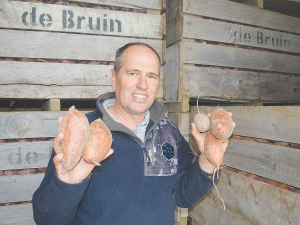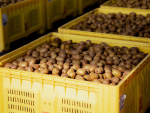The horticulture industry has come out of the Covid-19 lockdown more resilient and with better people management skills.
That’s the view of Vegetable NZ chairman and Dargaville kumara grower Andre de Bruin.
He describes the way growers and workers adapted to new workplace rules during the lockdown as “fantastic”. Growers adapted a “togetherness while being apart” approach with workers asked to practice social distancing while on farms. The workers rose the occasion.
On de Bruin’s kumara farm, harvesters were modified, screens erected to separate the driver, sorters and the bin person. The number of people on a harvester was reduced from eight to six.
“Being on the harvester is normally quite the social thing…but during the lockdown there were barriers and workers couldn’t see each other,” he told Hort News.
“They realised their responsibility and that we were doing this for their safety, our safety and food safety.
“The team was fantastic.”
De Bruin says for him this is the story of the vegetable sector – how growers worked to understand requirements to continue their businesses and how they successfully implemented changes. He recalls driving to one of his kumara farms on the first morning of the Level 4 lockdown.
“It was the strangest day of my life, I was the only car on the road and everyone had cars parked at home. I have never seen anything like that,” he says.
“It was like driving through an abandoned town and there was heavy feeling of responsibility…that I have got to do this right for all these people sitting in their houses.
“We had a big responsibility, not only to supply people food but operating in a manner that we were not vectors for spreading the disease.”
De Bruin recalls there was “a lot of talking” on the phone between growers as the country went into lockdown.
Growers who normally wouldn’t talk were exchanging ideas with each other. One huge change was that seasonal workers, hired for planting and harvesting vegetables, had become essential workers.
De Bruin says the attitude of workers to their job dramatically changed.
“On the last day before the lockdown they were meeting and greeting each other and they were told that’s the last time they can do that.
“They rose up to the challenge and the dedication they brought to work, day-after-day, was fantastic.
“They knew were all in this together and that was really good.”
Change for good
Andre De Bruin believes Covid-19 is far from over, but it has already changed the way we do business.
He says the way people buy their food has changed.
“Growers are adapting to a new normal and it’s changing on a weekly basis as other businesses open, change or close for good. It’s about navigating your way to ensure your business remains functional next week and next year.”
De Bruin says one thing Covid-19 has proved is that New Zealanders wants safe, fresh and quality New Zealand-grown vegetables. “When there is any potential for that to be disrupted, people are willing to stand in a queue half a mile long to get it from supermarkets.”
He says this underlines NZ’s credential as a producer of top food.











